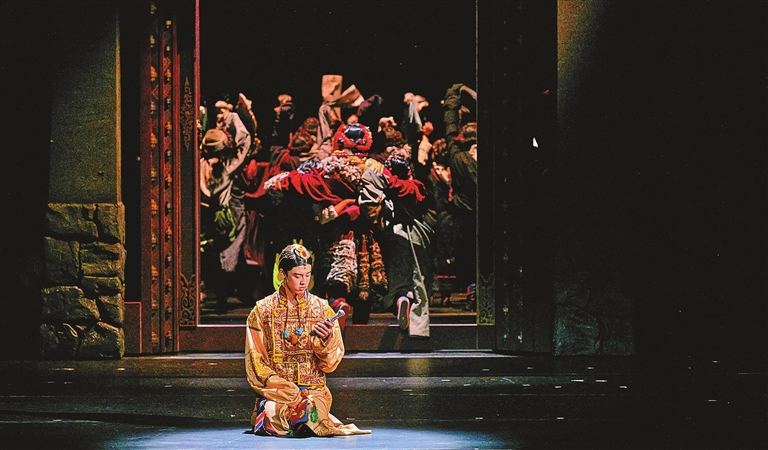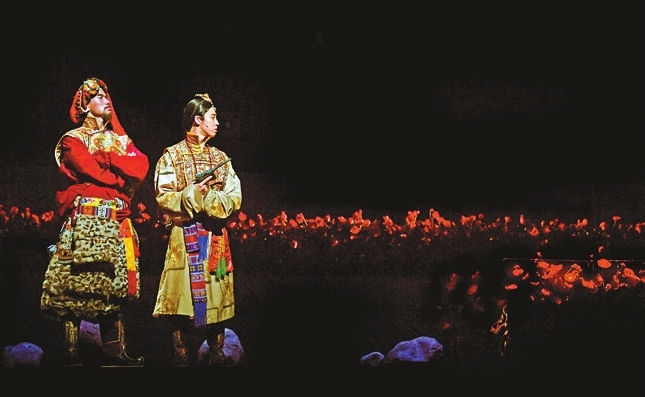


Debra Li debra_lidan@163.com UNLIKE many other plays that depend on boldface names in Chinese showbiz to guarantee box office, a recent show stars newcomers in leading roles and gains traction among literature fans. Adapted from A Lai’s “After the Dust Settled” (《尘埃落定》), the stage drama of the same title is directed by Hu Zongqi with a script written by Cao Lusheng. Starring Yang Zhengli, a student of the Central Academy of Drama in Beijing, the epic show set in Tibet in the first half of the 20th century will be staged at the Shenzhen Poly Theater from Thursday through Sunday. A Lai, a poet-turned-novelist, became the youngest Maodun literary prizewinner in 2000 for this novel, and made his reputation with his lyrical, poetic language and deep understanding of the Tibetan culture and society. Translated into English under the title of “Red Poppies,” the novel follows a family of Tibetan chieftains, the Maichi, during the decade or so before the liberation of Tibet by the People’s Liberation Army in 1951. Their feudal life in the Tibetan borderlands, narrated by the youngest “idiot” son, is described as cruel, romantic and full of intrigue. The story follows the comic vicissitudes and nutty coming-of-age of the Maichi clan’s Second Young Master, known far and wide as an idiot. The “idiot,” whose warlike older brother is being groomed to take over the family’s vast land holdings in what is now Sichuan Province, falls in and out of favor with his parents, who are never quite sure if his simple pronouncements mean he’s a true idiot or a sage. He attains manhood by sleeping with his mother’s maid, makes friends with the son of the family’s indentured executioner and learns much from such visitors as the Han special emissary, who promises to enrich the Maichi chieftain if he will plant opium poppies. Poppies are planted, swelling the family’s coffers, but also attracting the jealousy of nearby chieftains. When all the others start to plant poppies, the “idiot” suggests his family return to planting wheat. The price of the poppies drops because of oversupply, and in the process he helps to consolidate his family’s power and wealth with good sense and cunning. And cunning is what is required to survive in this brutal world, where tribal revenge is exacted by ordering decapitations and the cutting off of tongues and ears. There’s plenty of lusty sex in this picaresque novel, as well as bloody battles, devastating earthquakes, and the political maneuvering of Tibetan monks. Later in life, the “idiot” is enmeshed in the battles between the Communists and Nationalists, and witnesses the demise of his clan, including himself. Hu previously won over theater fans with the adaptation of Chen Zhongshi’s novel “White Deer Plain,” which was performed by Shaanxi People’s Art Theater and toured to over 72 Chinese cities. For the new show, the director collaborates with Sichuan People’s Art Theater. Keeping the main plotlines of the original novel, this adaptation has been commented upon by A Lai as being very faithful. A huge fan of the author and his poetic language, scriptwriter Cao has used long soliloquies by the “idiot” and voiceovers quoted from the novel to keep the story going. The technique, however, sparked controversy among audiences after the show debuted in Beijing earlier this year. Some criticized the scripter as being talentless and lazy, while others admired the language and the diligence of the leading actor who is required to recite more than 15,000 characters during the 215-minute show. The stage set by Gao Guangjian uses three two-deck terraces and four ladders to mimic the giant gaps between classes in the Tibetan society that was ruled by chieftains, which also conveniently provide the backdrop of the stories. Costume designer Chen Minzheng and his team conjure up more than 200 delicate costumes, using furs and other fabrics as well as ornaments purchased from the Tibetan areas. Shi Yicen provided the scores for the show, combining electronic music, strings, Tibetan folk instruments and folk songs to add depth to the show. In the last scene of the show, meteorites are lowered from the ceiling as a metaphor for the destruction of the Maichi chieftain clan, while the soul released from the dead “idiot” says his last lines. Such poetic moments abound, which, however, are regretted by some viewers as being unable to save a show they compared to a fancy audiobook. Then, for some true literature fans, reading a masterpiece alone provides a good night of entertainment. Children under 1.2 meters tall are not allowed at the show, which is recommended for those aged above 14, for it contains mature subject matter. Time: 7:30 p.m., April 29 and 30, May 1; 1:30 p.m., May 1, 2 Venue: Shenzhen Poly Theater Metro: Line 2 or 11 to Houhai Station (后海站), Exit E | 
